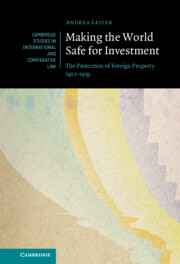Book contents
- Making the World Safe for Investment
- Cambridge Studies in International and Comparative Law: 178
- Making the World Safe for Investment
- Copyright page
- Dedication
- Contents
- Preface and Acknowledgments
- Prologue
- 1 Making the World Safe for Investment
- 2 The Palestine Railway Arbitration 1922
- 3 The Lena Goldfields Arbitration 1930
- 4 The Sheikh of Abu Dhabi Arbitration 1951
- 5 The Abs–Shawcross Draft Convention 1959
- 6 Conclusions
- Bibliography
- Index
- Cambridge Studies in International and Comparative Law: 178
2 - The Palestine Railway Arbitration 1922
Published online by Cambridge University Press: 23 February 2023
- Making the World Safe for Investment
- Cambridge Studies in International and Comparative Law: 178
- Making the World Safe for Investment
- Copyright page
- Dedication
- Contents
- Preface and Acknowledgments
- Prologue
- 1 Making the World Safe for Investment
- 2 The Palestine Railway Arbitration 1922
- 3 The Lena Goldfields Arbitration 1930
- 4 The Sheikh of Abu Dhabi Arbitration 1951
- 5 The Abs–Shawcross Draft Convention 1959
- 6 Conclusions
- Bibliography
- Index
- Cambridge Studies in International and Comparative Law: 178
Summary
This chapter engages with the Palestine Railway Arbitration of 1922 and draws out the techniques applied in the arbitration that framed new ways of protecting private property and laid the groundwork for the internationalisation of concession agreements. The chapter describes how introduction of the Mandate System and the inclusion of concession agreements into peace treaties (under the jurisdiction of mixed arbitral tribunals) enabled the advanced protection of private property on the international plane with special attention to the underlying modes of authorisation. It shows how these transformations can be understood as practices of jurisdiction that rely on a mode of self-authorisation. The Palestine Railway Arbitration is particularly illuminating of this point for two reasons. First, from a purely doctrinal perspective, the arbitration is full of formal flaws. It therefore raises the question of the source of the authority of law more pressingly than other arbitrations. Second, it appears that most legal inventions and changes were made out of a sense of necessity without much theorising. These observations point towards an account of law that is attentive to the actual practices of the actors involved.
- Type
- Chapter
- Information
- Making the World Safe for InvestmentThe Protection of Foreign Property 1922–1959, pp. 27 - 49Publisher: Cambridge University PressPrint publication year: 2023



